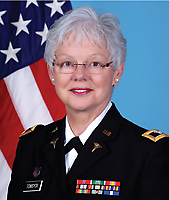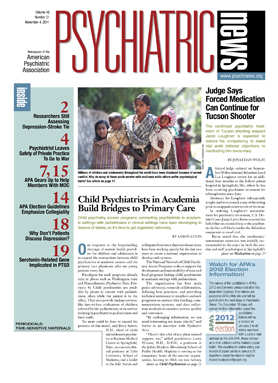What happens when a middle-aged female psychiatrist decides to join the U.S. Army?
Does she come close to failing the grueling physical endurance test that is basic training? Does she encounter fire during deployment? Does she win a Bronze Star medal?
In the case of Rebecca Tomsyck, M.D., it was all three.
Tomsyck was born and raised in South Carolina, one of seven children of an old-fashioned country doctor who made house calls and carried his equipment in a black medical bag. He inspired her to become a pediatrician as well as a child and adolescent psychiatrist, and she was in private psychiatric practice in Charlotte, N.C., for almost 20 years.
Then in 2005, at age 53, she decided that she wanted to join the U.S. Army for two reasons: She had always been a patriot and felt called to serve, she said, and she and her husband wanted to live in Europe. She managed to work out a contract with the Army that would grant her the rank of lieutenant colonel and assign her to the Army post in Heidelberg, Germany.
She started active duty in September 2005. She had to take the Army's three-month Officer Basic Course at Fort Sam Houston, Texas, which was incredibly difficult for her, she admitted.
"It was 104 degrees, and I am not a physical-workout person. But I had to get in shape to pass a physical-fitness test. I also had to learn how to put on gear and to use a weapon. However, some of the younger men and women coming in and commissioning with me were extremely helpful. As one of them put it, 'Ma'am, you're older than my mother. If she were doing this, I would hope that someone would help her.'"
In December 2005, she was sent to the Army post in Heidelberg to work as chief of child and adolescent psychiatric services. In addition, she had to learn Army lingo, Army rules, and use of electronic medical records. "When I joined the Army, I could Google and e-mail, but that was about it," she said.
Iraq Posting to "Stress Control Unit"
In December 2006, she was sent to Fort Bliss, Texas, where she got geared up, received more training, and was issued a weapon—a 9-mm pistol. She was then flown to Kuwait and told to "get on the manifest and call Catfish." "What is a manifest, and who the heck is Catfish?" she asked herself. "Catfish," she said, "turned out to be a small civilian in-theater air transport. I had to use it to find my own way from Kuwait to Iraq."
During her six months in Iraq, she worked with a combat stress control unit, and she and her colleagues diagnosed and treated soldiers for various psychiatric conditions. "Many of the problems I dealt with were the same as those that psychiatrists in a civilian environment see," she said. "It's just that some of the issues arose from soldiers being separated from their families."
She returned to Heidelberg in June 2007 and worked three more years there—this time as chief of behavioral health services—and was promoted to the rank of colonel in October 2009. Then in July 2010 she was deployed to Afghanistan.
Leadership Position in Afghanistan
She was stationed at an Air Force trauma hospital at Bagram Air Field where anesthesiologists and surgeons worked around the clock, and where she and her clinic staff saw inpatients, outpatients, and emergency room patients for various psychiatric conditions. One day the commander called her into his office and said that he wanted to make her the commander of an Air Force combat operational stress control detachment.
"It was with some anxiety that I took that position," she said, "because even though I knew a lot about psychiatry, and even though I knew something about the Army, I knew nothing about the Air Force." But she held that position until the end of her deployment in Afghanistan last January.
And during these months, she and her staff helped not only soldiers, sailors, airmen, and marines, but also the 300 or so staff members of the trauma hospital deal with all sorts of challenges—anxiety, depression, marital problems, financial problems, sleep issues, suicidality. In addition, she reviewed the paperwork when service members had to be evacuated out of her command area for psychiatric reasons.
Your Mind Is in 'Survival Mode'
She acknowledged that she faced multiple dangers while in Iraq and Afghanistan. "In Iraq, there was a lot of mortaring and shooting, and once I hid under a jeep to escape mortars."
The months in Iraq and Afghanistan also meant nonstop work for her and her staff—"seven days a week from 8 a.m. until we were through"—as well as sleep deprivation in Afghanistan since they lived near runways where jets and helicopters were constantly taking off and landing. "Your unconscious mind—this is the psychiatrist in me coming out—never lets down its guard because it has to protect you. It's in survival mode." But she found the work incredibly gratifying, she said.
Finally, this summer, while back in Heidelberg, she learned that she had been awarded a Bronze Star. It was for meritorious service while serving as a hand-picked Army commander of an Air Force combat operational stress control detachment in Afghanistan.
"I was shocked," she said, "because, in my mind, a Bronze Star is for heroes. I wasn't a hero; I was just doing my job." In any event, she emphasized, "I tell people that my Bronze Star wasn't an individual award, but a team award. I couldn't have received it if it hadn't been for all the wonderful people under my command and all the things they did under my leadership."
Actually, when Tomsyck signed up with the Army, her contract was for four years of active duty and four years of Reserve. But she then extended the four-year Reserve time to four-year active duty time. So by the end of 2013, she will have been on active duty for eight years. She then plans to stay two more years in the Army, to 2015, when she is 63. During the next two years, she knows that she'll be serving in Germany, but after that, she's not sure where she will be.
If Tomsyck had to do it over again, would she have joined the Army? "In a skinny minute," she said. "I guess I have to say that I had the guts to walk through the door. But I feel fortunate and blessed to have been given this opportunity."


